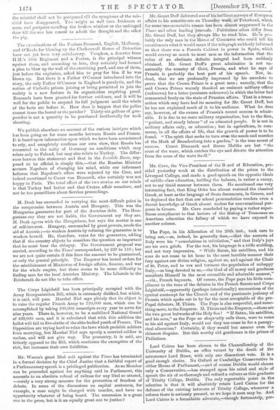The Pope, in his Allocution of the 20th inst., took
care to bring out,—as, indeed, he generally does,—that the sorrows of Italy were his "consolations in tribulation," and that Italy's joys are his own griefs. For the rest, his language is a trifle scolding, and not very impressive. "While Satan, his satellites, and his sons do not cease to let loose in the most horrible manner their fury against our divine religion, against us, and against the Chair of St. Peter, and to vex and torment the population of unhappy Italy,—so long devoted to us,—the God of all mercy and goodness manifests Himself in the most ostensible and admirable manner," —viz., French bayonets. Of course, the Pope pays his little com- pliment to the tone of the debates in the French Senate and Corps Legislatif, —apparently (perhaps intentionally) unconscious of the cynical contempt for the Church and of the passionate jealousy of Prussia which spoke out in by far the most acceptable of the pro- Papal debaters, M. Thiers. The Pope is also respectful, and some- thing more, to the Emperor. M. Thiers and the Emperor,—these are the two great bulwarks of the Holy See ! "If Satan, his satellites, and his sons," as the Pope so eloquently calls them, were to come to his aid against Italy, would not they too come in for a panegy- rical allocution? Certainly, if they would but assume even the thinnest disguise. But this worthy old gentleman is the prince of Philistines.






























 Previous page
Previous page